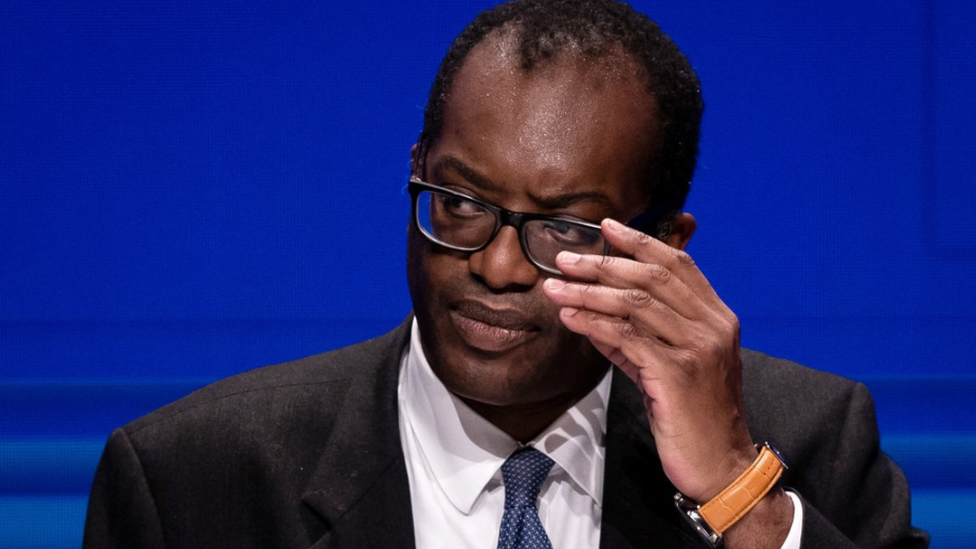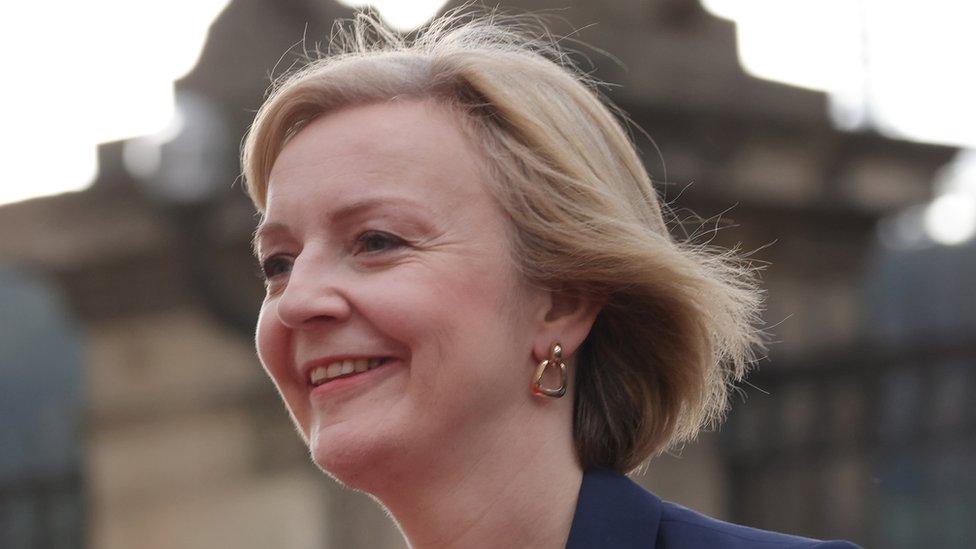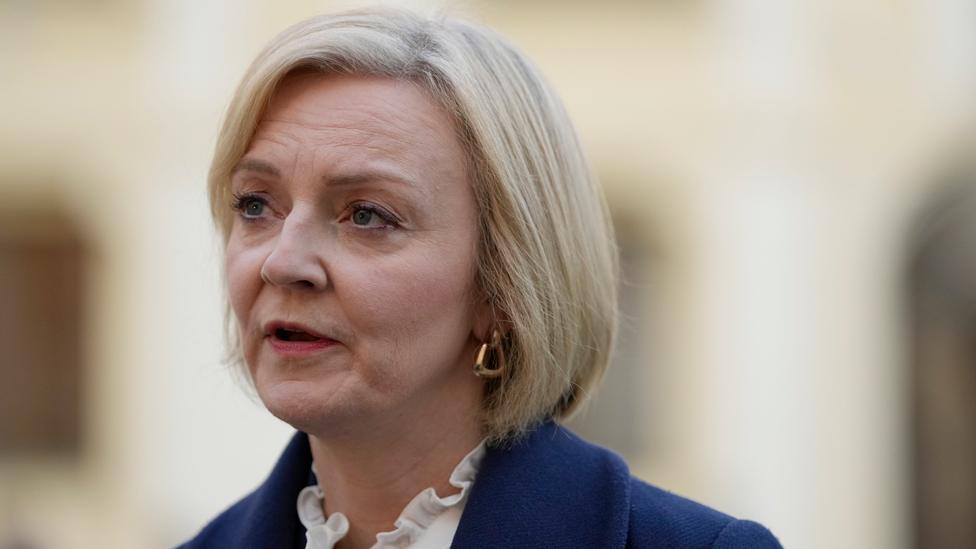Kwasi Kwarteng: Investors wary as economic plan brought forward
- Published
- comments

The chancellor's decision to bring forward the date of his plan to balance the government's finances failed to reassure markets on Monday.
Government borrowing costs rose sharply after Kwasi Kwarteng said he would fast-track his plan to 31 October.
The plan will set out how he will fund tax cuts and reduce debt after his mini-budget sparked market turmoil.
An independent forecast of the UK economy's prospects will be published at the same time.
In the wake of the September mini-budget, the pound slumped to a record low, government borrowing costs surged and the Bank of England was forced to step in and take emergency action after the dramatic market movements put some pension funds at risk of collapse.
The volatility eased but on Monday the yields - or effective interest rates - on UK government bonds were almost at the levels seen at the height of the market turmoil.
Further efforts by the Bank of England to calm markets, along with the appointment of an experienced civil servant as Permanent Secretary to the Treasury also seemed to fall short.
Former Treasury chief Lord Macpherson warned the government that there could be an even tougher response from the financial markets in the coming weeks if the chancellor could not show his sums added up.
"Unless the government can restore economic credibility, the market response in the weeks ahead could be a whole lot worse than we've seen so far," he told the House of Lords.
'Critical to millions'
Mr Kwarteng had initially said he would wait for 23 November to give details of his economic plan but faced mounting pressure from his MPs to change course.
The new date means Mr Kwarteng's fiscal statement will be published before the Bank of England announces its latest decision on interest rates on 3 November.
The Bank's Monetary Policy Committee (MPC) is widely expected to raise interest rates for the eighth time since last December with many economists forecasting a sharper rise than previous increases.
But Mel Stride, chairman of the Treasury Select Committee, tweeted that he hoped Mr Kwarteng's decision to release the report earlier would result in a smaller rate rise.
He tweeted this would be "critical to millions of mortgage holders",
Noting that that the plan will be published on Hallowe'en, Labour deputy leader Angela Rayner tweeted: "Trick or cheat? The Tory horror show rattles on."
The OBR, the independent budget watchdog, will now publish a report alongside Mr Kwarteng's statement at the end of October. Its forecasts will give an indication of the health of the nation's finances.

Analysis
By Dharshini David, BBC economics correspondent
The chancellor bringing forward his explanation of how he intends to get down government debt and the official watchdog's assessment of his plans to Hallowe'en is aimed at quelling the market turmoil which has driven up borrowing costs for households and government.
Providing reassurance on that score will likely mean confirming unpalatable news for others. For most economists reckon that, even if the government can boost growth, it will realistically need to find savings of perhaps £40bn or more, if it is to bring down debt in a few years.
But by anyone's measure that's not small change, it's an amount greater than the defence budget, and won't be raised through efficiency savings. Many public services are already hampered by pandemic disruption and rising inflation. The Institute for Fiscal Studies reckons the latter means departments have to find £18bn from existing budgets just to provide planned services.
On top of that balancing act, they'll be bracing for a new wave of austerity.
Borrowers have faced paying the price for the markets' lack of faith in the government's plans - millions more may feel the cost of regaining it.

There was some confusion after the chancellor denied there had been any changes to the date of the fiscal statement.
However, Treasury sources then clarified that the chancellor would, indeed, bring it forward and that it had simply been waiting to officially announce the change of date in Parliament.
Since then the government has been forced into a series of embarrassing climbdowns under growing pressure from its own MPs.
Last week, Mr Kwarteng scrapped a decision to cut the top rate of income tax.

Liz Truss faces a rebellion from her MPs over benefits
And on Monday, James Bowler was announced as the new Permanent Secretary to the Treasury.
Ms Truss fired Sir Tom Scholar, the civil servant who previously held the job and planned to bring in a high profile outsider - a move some feared would further spook the markets.
Ms Truss still faces a potential rebellion from her MPs after declining to say whether she would increase benefits in line with inflation next April.
Her approval ratings have plummeted since the mini-budget. The prime minister says her tax cuts will boost the UK economy after years of lacklustre growth.
But there are fears the government will have to borrow huge sums to fill the spending gap. The cost of government borrowing consequently jumped, as investors demanded higher rates of interest on UK government bonds.
This has fed through to the mortgage market where hundreds of products were pulled due to concerns about how to price these long-term loans.
Last week, interest rates on typical two and five-year fixed rate mortgages topped 6% for the first time in over a decade.
'Clearly nervous'
On Monday, the Bank of England announced measures to ensure an "orderly end" to an emergency bond buying scheme it was forced to launch after Mr Kwarteng pledged additional tax cuts on top of those outlined in the mini-budget.
Susannah Streeter, senior investment and markets analyst at Hargreaves Lansdown, said that the government and the Bank had launched "a two pronged attempt to calm markets" as the pound remained weak and government borrowing costs were rising again.
"Policymakers and politicians are clearly nervous about seeing a repeat of the mini-financial crisis unleashed following the presentation of the Truss administration's slash and spend plans," she said.
"All eyes will be on the independent assessment of his spending plans, and the risk is that if the numbers don't add up, the markets could take fright again."
Related topics
- Published10 October 2022

- Published3 October 2022
